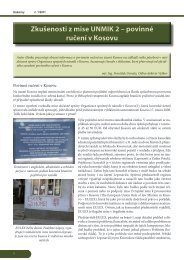TRADOC Pam 525-3-7-01 - TRADOC - U.S. Army
TRADOC Pam 525-3-7-01 - TRADOC - U.S. Army
TRADOC Pam 525-3-7-01 - TRADOC - U.S. Army
- No tags were found...
You also want an ePaper? Increase the reach of your titles
YUMPU automatically turns print PDFs into web optimized ePapers that Google loves.
<strong>TRADOC</strong> <strong>Pam</strong> <strong>525</strong>-3-7-<strong>01</strong>Soldiers in action, impersonal centralized boards select officers for promotion. Some perceivethis as a process of promoting files rather than officers. A promotion process that balances localand centralized input could provide a more effective process. The leadership chapter addressesthis as well as command selection as systems worthy of scrutiny for potential modification in thefuture.The <strong>Army</strong> should consider modifying the promotion system from the current “up or out” to a“perform and stay” system. Such changes would require congressional action and would affectother Services. Policy changes could include expanding promotion zones and allowing officersto choose their promotion consideration timeframe within time in grade milestones; adjusting payscales for officers remaining in grade longer; and, offering non-monetary incentives, such asgeographical stability. The <strong>Army</strong> could also develop multiple career tracks for officers to allow abetter match between career track and individual skills and preferences.Performance appraisals should place greater emphasis on innovation, creativity, andadaptability. The <strong>Army</strong> might consider adding a 360-degree appraisal across the force withsubordinates, peers, and supervisors providing input about a candidate’s receptivity to ideas frombelow and efforts to put them into action. A 360-degree appraisal would not replace traditionalevaluation methods, such as test scores and fitness reports, but provide supplementaryinformation about dimensions of performance. This is a highly controversial proposal rife withpitfalls, but one that requires consideration if the <strong>Army</strong> is to change to meet future challenges.Promotion and pay are key motivators for retention. Leaders in key specialties that requireextensive education or training with slower promotion opportunity require more options forretention. The <strong>Army</strong> should explore a system to accommodate pay increases without promotion,based on specialties where grade progression is slower and time in grade more pronounced. Thiscould take the form of tying pay increases to assessment of performance creativity, innovation,adaptability, and effectiveness.All of these suggestions have merits and faults. Allowing some to serve a longer time ingrade may enable retaining highly qualified individuals longer, but the downside might bestagnation and a reluctance to adapt to changing requirements. Decentralizing officer promotionsmay produce better choices based on recent observation of candidates while on the job. It canalso lead to favoritism and an unhealthy competition in a relatively smaller cohort. As the <strong>Army</strong>explores ways to meet the requirements of the future Modular Force it must be open to all of theideas mentioned above, as well as other innovations.Personnel systems that support an <strong>Army</strong> human capital strategy must balance the needs of theforce as a whole and the needs of the individual. In this regard, the readiness of units and theability of the institution to support operational forces are more important than the needs of theindividuals that make up the force. Additionally, the evaluation of potential leaders must includea method to identify those who fully understand the intricacies of command and possess theintuition and innovativeness for success.Through the continuum of service initiative, a flexible range of personal extended leaveprograms would accommodate the needs of the individual and the <strong>Army</strong>. This would157



